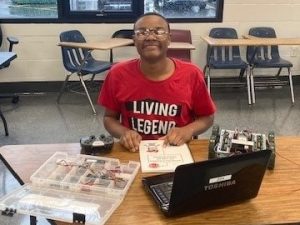PEP Students Earn College Credit for Robotics, Soldering
Many students who attend PEP Eastwood will be the first in their families to graduate from high school. Now, many of them have a new achievement to add to the list: earning college credit. Thanks to a collaboration with Tri-C, students at PEP Eastwood can earn college credit through College Credit Plus. The program began last year with a robotics class and has continued this school year with soldering. Next up, PEP Eastwood will offer a class on drones.
The program is making a big impact on students. Many students from PEP Eastwood have faced trauma or chronic stress that has impacted their development. For some, that means academic success feels out of reach. Having the opportunity to participate and succeed in a college-level curriculum has been a game changer in the way some of these students see themselves and their futures.
Long-Term Opportunity

Curtis Davis, a senior at PEP Eastwood who took the robotics and soldering classes and is now preparing to integrate back into his home school district, is a good example. Davis was recently selected to represent PEP Eastwood as part of a team of outstanding Northeast Ohio students who will work on a special robotics project at Tri-C. Once the project is complete, the team will travel out of state to compete against other high school students. All students chosen to participate on this team are also eligible to enroll in any Tri-C course of their choosing for free. By the time Davis graduates in May, he will be well on his way to earning an associate degree at Tri-C.
The long-term opportunity this presents is not lost on Davis. “I really enjoyed the time in Robotics and Soldering,” he said. “We made some cool things, and now that I’ll be attending Tri-C, it may turn into a career.”
Immediate Benefits
In addition to the more long-term impact this programming has on students, it is also has more immediate positive benefits. First, the classes are more hands-on and practical, giving students the chance to try something new that many of them find very engaging. The skills required for these classes are also repetitive, rhythmic and rewarding — a combination that brain science tells us helps people with emotional regulation.
“It’s not just sitting in a classroom and lectures,” explained Matt Dugovics, vocational manager. “It prepares them for what comes next, whether that is college or the workforce. If they want to attend Tri-C, it’s an easy transition. They have started to see their futures in a whole new light.”
To learn more about PEP Eastwood or PEP’s other Day Treatment Centers visit our website. To see if a student in your district may be a good fit, contact Nicole Molnar, clinical coordinator, at 216-361-7760 ext. 110 or via email.
*Please note, referrals are made through school districts. Interested parents or caregivers should contact their school administrator.*
